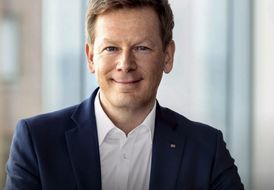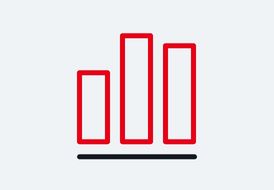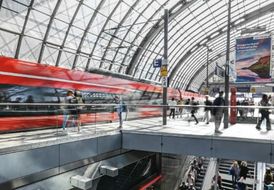Environmental measures
- Fuel consumption: The regional energy savings system software (RESY) is used in 21 diesel networks. A total of 840 DB Regional diesel trains and locomotives are equipped with the software, which corresponds to a share of 67%. Compared with 2019 (before the introduction of RESY), a total of 3 million liters of diesel and over 8,000 tons of CO₂e were saved in 2022.
- Alternative drives:
- As part of the H2goesRail project, the newly designed hydrogen train Mireo Plus H was presented in May 2022 together with Siemens Mobility.
- Together with Alstom, DB Regional has successfully tested the first battery-operated train in passenger operations in cooperation with the Federal states of Baden-Württemberg and Bavaria. Until early-May 2022, the train operated on the Stuttgart — Horb line in Baden-Württemberg on week days.
- In 2022, another 49 electric buses were put into operation. The electric bus fleet will continue to be expanded in the future, with an expected expansion to about 150 electric and 25 fuel cell buses by the end of 2024.
- By concluding a framework contract with EBUSCO, up to 230 electric buses can be ordered from 2023 to 2026. This further reduces the greenhouse gas emissions of the bus fleet.
- Biofuel: Since September 2022, 57 DB Regional trains have been using climate-friendly biofuel on services through Baden-Württemberg. To this end, we have completely switched the filling stations in Aulendorf to HVO. By the end of 2023, trains are to be filled with 1.3 million liters of biofuel here. The use of biofuel is an immediate climate protection measure and an important step towards the phase-out of diesel and achieving climate neutrality. In most cases, diesel trains do not have to be specially modified to run on biofuel.
- Autonomous transport services: In Bad Birnbach, two autonomous shuttles carry passengers on demand. The electric vehicles can be booked via an app. Booking requests are grouped into car pools, allowing efficient and climate-neutral mobility over the last mile.
- Water consumption: In Berlin-Grünau, a new washing facility has been commissioned for the new S-Bahn (metro) trains in Berlin. Used service water is treated in such a way that up to 90% can be reused.
- Mobility hubs: The scheduled bus service remains a central component of strong local public transport, but does not fully realize its potential until it is linked to other mobility services, such as on-demand transport services, which can be used as needed. This is the conclusion of the Mobility Transition 2030 Study from DB Regional Bus and the Fraunhofer Institutes IESE (Fraunhofer Institute for Experimental Software Engineering IESE) and IML (Fraunhofer Institute for Material Flow and Logistics IML). We are pursuing this approach at mobility hubs, such as the Stuttgart-Vaihingen S-Bahn (metro) station: here, passengers can book and use many climate-friendly mobility services (including hire bikes, car sharing and charging stations for electric cars) over a digital network.


